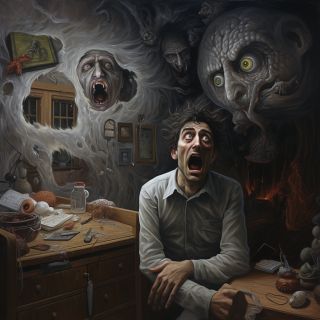ANXIETY- Effects of Anxiety on Creativity. How anxiety can hinder, color, or compel creativity.

KEY POINTS-
- Anxiety can hinder creativity, shifting focus to fears instead of artistic work.
- Moderate anxiety can motivate and focus attention, aiding in creative endeavors.
- Fear of failure and judgment often impedes artistic originality and risk-taking.

In the United States, anxiety disorders affect about one-third of the population. So it’s no surprise that a good number of artists and writers also suffer from anxiety.
But whereas some critics see Vincent van Gogh’s striking paintings and Sylvia Plath’s confessional poetry as the direct result of their psychosis, I tend to be less romantic about this subject. I see their brilliant output as having happened in spite of—rather than because of—their mental anguish.
In my new book, Afraid, I explore the interaction between fear, anxiety, and creative work.
They’re more intertwined than you might think: Depending on the situation, fear and anxiety can either inspire or impede. But when anxiety becomes overwhelming, creative work often stalls.
Anxiety as a Roadblock
The most basic way anxiety can hinder creative work is by shifting attention away from that work and toward fears and worries.
If a writer is worried about losing her day job, it’s harder for her to focus on her writing. Excessive anxiety bypasses all nonthreat-related tasks, and people regress to basic survival mode. Most attention, thinking, and emotions will be focused on dealing with the source of the danger, whether it’s real or imagined. And creative minds are especially adept at the latter.
Because fears center on survival, people become less flexible and more wary when they’re scared and anxious. At that point, going down a known path is far more appealing than taking risks and venturing into the unknown. Suffice to say, an aversion to the unknown won’t often lead to creative breakthroughs.
Another way fear can hinder creativity has to do with fear of rejection.
Friends, family, colleagues, and critics often resist unusual ideas or those that stray from established artistic norms. Aside from arising out of envy and competition, these reflexive reactions also make sense from an evolutionary perspective: Norms and agreed-upon ways of thinking cultivate group harmony. History is filled with the rejection, mockery, and oppression of novel ideas and styles deemed too “out there”—painters Claude Monet and Frida Kahlo and author Herman Melville were all harshly criticized, dismissed, or persecuted by their contemporaries.
To create something truly original, an artist must often break from the status quo.
So it’s only natural that any creative endeavor will lead to fear of criticism, rejection, or failure. The road less traveled might be more dangerous. It might even be fruitless. And sometimes the cost is one’s life: Socrates was executed on charges that his probing questions were corrupting young people, while Italian philosopher Giordano Bruno was burned to death, in part, for his heretical claims that the Earth was not the center of the universe.
When Anxiety Inspires
This is not to say that being cool as a cucumber is a requisite for great art. Some level of anxiety can serve a purpose.
While being truly terrified can paralyze you, being bored and feeling languid can grind your motivation to a halt.
There’s a sweet spot of anxiety that actually harnesses motivation and cognition and directs all attention to the task at hand.
With the deadline for Afraid fast approaching, I felt a pang of anxiety that propelled me to the finish line: I decided to tuck myself away in a resort next to the mountains in Tucson for two weeks and work 12-hour days to wrap up the book. The anxiety of not meeting the deadline was enough to inspire me to buckle down and get the job done.
Then there’s the specter of death.
No one is spared. Yet, even as geniuses like Michelangelo and Charles Dickens met the same fate as their peers, their brushstrokes and words became eternal.
Creative work is a way to achieve a certain level of immortality—art and books and articles that live on past your expiration date.
American anthropologist Ernest Becker argued that fear of death motivated humans to compose stories, myths, and legends about the afterlife and immortality, and it inspired great works of architecture like the Egyptian pyramids.
This existential dread has also motivated authors and artists to seek a form of immortality through their work. I find it somewhat comforting that after I am dead, some of my scientific discoveries and writings might continue to live through others.
In fact, you might be reading this piece long after I am gone.
What You Can and Can’t Control
Creative work entails traversing a mental landscape that can be treacherous, whether you’re mining your imagination, plotting your next steps, or plumbing your memories. Failure always looms.
This uncertainty can elicit fear and doubt.
Interestingly, fear is solely focused on survival, while creativity operates at its best when basic survival needs are met. Furthermore, fear is a primitive emotion, whereas art, science, and culture are among humankind’s most evolved abilities.
But fear and creativity are also similar in that both possess automatic and intuitive processes. The best works of art are not the sole result of logical thinking. Like a fetus, art grows inside the artist autonomously while the artist keeps feeding it; when the time comes, delivery happens. Fear is also mostly autonomous: When you notice a car barreling toward you, you leap out of the road before thinking about the driver’s intentions.
In that sense, people don’t fully control their fear and creativity. For both to work productively, a balanced harmony needs to exist between the unconscious and the conscious mind.
Cultivating Your Creativity
Still, there are elements of your consciousness that you can influence.
If you want to create something but feel inhibited by writer’s block, hesitancy, or insecurity, think about which kind of fear might be holding you back.
Is it fear of failure or judgment? Fear of your own inner critic? Or is there a different day-to-day challenge or responsibility that’s soaking up most of your attention?
Once you’ve identified the source of the anxiety, see if you can reframe the fear in an objective way that liberates you from its shackles. Maybe you can recognize failure as a possibility but ultimately something that won’t kill you: You can always just try again.
Another option is to engage your brain’s reward circuitry—say, thinking of the possible positive outcomes of your work, including immortality. Or you could use the fear network to your advantage, remembering a deadline, a promotion that might hinge on the work, or the crummy feeling of not completing a task. Breaking the work into pieces will also make it seem more doable and less scary.
Sometimes, shaking things up with a change of scenery can help. When I went away to finish Afraid, I chose the desert not only because I find the landscape inspiring. There’s also something about the starkly different and empty geography that clears my head from all of the clutter of daily life back in Michigan.
Just as there are many paths to take as you pursue a creative endeavor, there is a range of strategies to combat or use all of the little fears that crop up along the way.
- Questions and Answers
- Opinion
- Motivational and Inspiring Story
- Technology
- Live and Let live
- Focus
- Geopolitics
- Military-Arms/Equipment
- Безопасность
- Economy
- Beasts of Nations
- Machine Tools-The “Mother Industry”
- Art
- Causes
- Crafts
- Dance
- Drinks
- Film/Movie
- Fitness
- Food
- Игры
- Gardening
- Health
- Главная
- Literature
- Music
- Networking
- Другое
- Party
- Religion
- Shopping
- Sports
- Theater
- Health and Wellness
- News
- Culture

